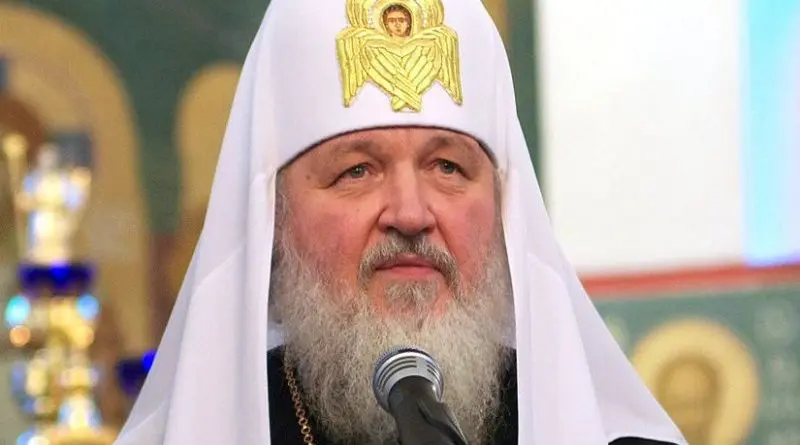Moscow Moving From Trying To Block Autocephaly To Planning On How It Can Benefit – OpEd
By Paul Goble
The Kremlin and the Moscow Patriarchate remain totally opposed to autocephaly for the Ukrainian church, but in recognition of near certainty that the Universal Patriarch is going to extend that independent status to Kyiv, Moscow is increasingly thinking about how it can exploit this event for Moscow’s political and religious benefits.
That shift does not mean that the Kremlin or the Moscow Patriarchate is going to stop opposing autocephaly for Ukraine; and it certainly does not mean the Russian government and the Russian church won’t do what they can to blacken the reputation of the Ukrainian church by propaganda or by active measures.
Thus, they are already attacking officials and churchmen in Ukraine – for an especially egregious but sadly typical example, see versia.ru/ukrainskuyu-pomestnuyu-cerkov-mozhet-vozglavit-sekretar-sovbeza-aleksandr-turchinov – and Putin’s longstanding use of provocations, including organizing violence that Moscow blames on others, will likely play a role.
Kyiv and the West must be prepared for that because if there is violence against Russian Orthodox believers or churches in Ukraine, the Kremlin propaganda machine will work overtime to ensure that many will believe its version of events and blame the victim, in this case Ukraine, as has happened so often in the past.
But more significantly, Russian officials and Russian Orthodox churchmen in Moscow are now talking about what they can achieve from the split in world Orthodoxy they plan to promote when Ukraine’s church gains autocephaly. Indeed, some in the Russian capital believe, despite the obvious losses the Moscow Patriarchate will take, they may come out ahead.
On the Versiya portal, commentator Ruslan Gorevoy discusses what he calls “The Orthodox War” and asks “what will the Russian Orthodox Church of the Moscow Patriarchate lose and what will it gain from the split the Universal Patriarch has provoked” (versia.ru/chto-poteryaet-i-chto-mozhet-priobresti-rpc-mp-ot-raskola-provociruemogo-vselenskim-patriarxatom).
The losses that the Moscow Patriarchate will suffer after autocephaly are obvious: Ukrainians are more religiously active than Russians are, and the Moscow church will lose many of its bishoprics and parishes, a major source of income and an essential part of its claim to be the largest Orthodox church in the world.
But, Gorevoy suggests, the Russian church will pick up something possibly more valuable. Up to now, Orthodox churches have viewed the Constantinople Patriarchate as first among equals, often deferring to it. Now, even before autocephaly but as a result of Constantinople’s actions, ever more of them are looking toward others instead – most prominently to Moscow.
Given the size of the Russian Orthodox Church of the Moscow Patriarchate and its wealth, both from church collections and the kind of economic activities the Putin regime has allowed it to engage in untaxed and unreported, the Moscow Patriarchate is in a position to “help” other churches view it and not Constantinople as the center of Orthodoxy.
Consequently, Gorevoy says, Universal Patriarch Bartholemew has overplayed his hand in the Ukrainian case, leading many of the existing autocephalous churches offended and looking for leadership elsewhere. Their desire for communion thus works for Moscow which has cast itself in this case as a defender of the status quo.
As Gorevoy points out, “among the leaders of world Orthodoxy, Bartholemew is counted first among equals. After all the Constantinople throne is the oldest in the world, one thought to have been founded by the apostle Andrey the First Called. But ‘oldest’ does not mean the wealthiest or the most influential.”
Only three percent of the world’s Orthodox are under its rule, and it is a very poor sister to Moscow which can deploy funds to encourage other Orthodox churches to support its positions, something it has often done overtly and likely covertly including during the current controversy.
According to Vladimir Shmaly, the former secretary of the Moscow Patriarchate’s theological commission, Bartholemew wants to make Constantinople into “an Orthodox Vatican;” and to do that he has to “destroy the Moscow Patriarchate” by splitting off its churches and bishoprics in Ukraine.
Thus, “the goal of an autocephalous Ukrainian campaign by Constantinople is not Ukraine but ‘the expulsion’ of the Moscow Patriarchate from the community of Orthodox churches,” thus allowing Bartholemew to “play the role either of a Byzantine emperor or an Eastern pope,” Shmaly says.
Moscow political analyst Lev Vershilin sees an even more disturbing possibility in Constantinople’s actions. In his view, the Universal Patriarchate wants to put the Moscow metropolitanate under a Kyiv patriarchate, “a first ‘symbolically’ and then in reality,” and over time, declare other autocephalous churches in Siberia, the Urals and the Far East.”
Another Russian analyst, Rostislav Ishchenko, says that by declaring a religious war in Ukraine, Constantinople is pushing true Orthodox Christians to form their own militias to combat this effort. As a result, he says, there will be “rivers of blood” in Ukraine. “As a result, the Ukrainian state will be destroyed,” and Constantinople will suffer a clear defeat.
It would appear, Gorevoy concludes, that “Moscow should act in a more restrained fashion” than Ishchenko says others will lest it lose its credibility and the influence it has gained because of Constantinople’s overreaching. But of course, what the Russian government may do covertly and then blame on the Ukrainians is another thing altogether.

